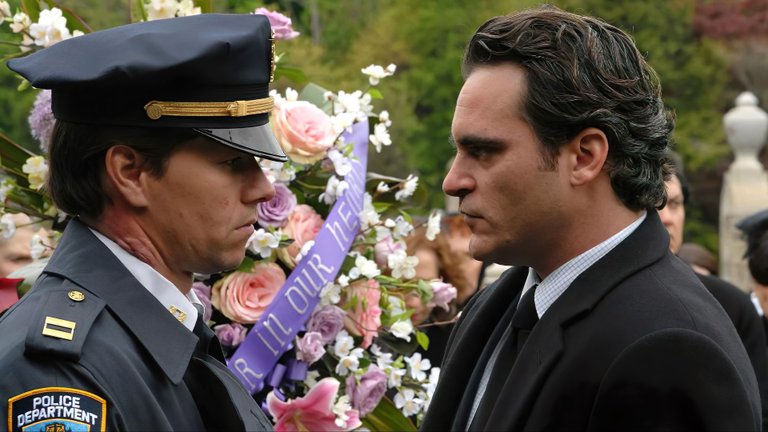Film Review: We Own the Night (2007)

James Gray's career as director began with films like Little Odessa and The Yards, both of which delve into the dark undercurrents of organised crime and corruption in New York City. His third film, We Own the Night, released in 2007, continues to explore similar themes but is often perceived as more conventional compared to its predecessors.
Set in 1988 Brooklyn, the film introduces us to Robert "Bobby" Green, portrayed by Joaquin Phoenix. Bobby manages a nightclub in Brighton Beach, an area predominantly inhabited by immigrants from Soviet Union. His life appears enviable: he has an attractive Puerto Rican girlfriend, Amada (Eva Mendes), and dreams of owning his own club. However, this dream is complicated by the fact that his current establishment serves as a front for drug trafficking operations run by the Russian Mafia. Bobby's attempts to ignore this reality are shattered when the NYPD conducts a raid on his club. The tension escalates further due to his estrangement from his family—his brother Joseph (played by Mark Wahlberg), a captain in the NYPD, and his father Albert "Burt" Grusinsky (played by Robert Duvall), a deputy chief. Initially reluctant to assist his brother in a sting operation against the mobsters, Bobby's resolve changes when his brother's life is threatened.
Critics met We Own the Night with lukewarm enthusiasm, which was not entirely unexpected given the high expectations set by Gray's earlier films. The narrative arc and character development felt somewhat lacking, leading many to view it as inferior to its predecessors. The film's premise—a protagonist indirectly involved in organised crime while being related to law enforcement—seems implausible within the tightly-knit immigrant community depicted. Gray, who also wrote the script, has crafted a story that feels derivative and laden with clichés. The central conflict—Bobby's duality as a nightclub manager and his familial ties to law enforcement—lacks the nuance that characterised his earlier works.
Despite its shortcomings, We Own the Night stands out for its stylistic choices. Gray deliberately employed cinematography and production design reminiscent of gritty 1970s police thrillers, creating an atmosphere that feels both nostalgic and immersive. The film’s pacing is notably slow, which may test modern viewers' patience but also serves to highlight some of its narrative flaws.
Two elements elevate We Own the Night above its narrative limitations: Joaquin Phoenix's performance and an innovative car chase scene. Phoenix delivers a compelling portrayal of Bobby Green, showcasing vulnerability and depth rarely afforded to male leads in crime dramas. His ability to convey complex emotions allows him to overshadow not only Mark Wahlberg but also veteran actor Robert Duvall, who plays Bobby’s father with subtlety despite limited screen time.
Another notable aspect of We Own the Night is its innovative car chase sequence. Gray meticulously studied similar scenes from other action thrillers to craft a memorable experience that stands out within the film. This detail alone is almost worth watching the entire film for.
We Own the Night, despite its flaws, remains an intriguing exploration of familial ties amidst chaos, albeit one that could have benefited from greater originality and depth.
RATING: 6/10 (++)
Blog in Croatian https://draxblog.com
Blog in English https://draxreview.wordpress.com/
InLeo blog https://inleo.io/@drax.leo
Hiveonboard: https://hiveonboard.com?ref=drax
Rising Star game: https://www.risingstargame.com?referrer=drax
1Inch: https://1inch.exchange/#/r/0x83823d8CCB74F828148258BB4457642124b1328e
BTC donations: 1EWxiMiP6iiG9rger3NuUSd6HByaxQWafG
ETH donations: 0xB305F144323b99e6f8b1d66f5D7DE78B498C32A7
BCH donations: qpvxw0jax79lhmvlgcldkzpqanf03r9cjv8y6gtmk9